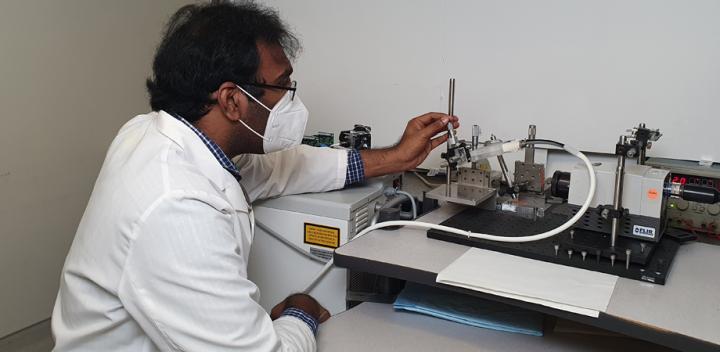The annual award will support the development of Katta’s doctoral research, as well as his efforts to translate benchtop advancements into clinical successes

Credit: Dr. Wangcun Jia.
BELLINGHAM, Washington, USA – SPIE, the international society for optics and photonics, has announced Nitesh Katta, who received his PhD in 2019 from the University of Texas at Austin, as the winner of the 2021 SPIE-Franz Hillenkamp Postdoctoral Fellowship in Problem-Driven Biomedical Optics and Analytics. The annual award of $75,000 supports interdisciplinary problem-driven research and provides opportunities for translating new technologies into clinical practice for improving human health.
Katta’s research project, “A cold Laser Wire (CLW) for true-lumen crossing of tortuous coronary arteries with calcified chronic total occlusions (CTOs)” — conducted in conjunction with Thomas Milner and Marc Feldman at the Beckman Laser Institute and Medical Clinic — will build on a challenge Katta discovered during his doctoral work: in recognizing an unmet need for piercing calcified material in performing true-lumen percutaneous coronary intervention (PCI) of chronic total occlusions (CTOs), Katta, together with his then-doctoral mentors Milner and Feldman, invented intravascular cooling and guidance methodologies for achieving true-lumen crossing in CTOs using the cold laser wire. Katta’s aim is to bring this research into the clinical setting, addressing an urgent clinical need of a tool for safe PCI in patients suffering with CTOs.
“I am deeply grateful to receive this support from such a distinguished organization as SPIE and feel very humbled to have the SPIE-Hillenkamp fellowship committee recognize the value of this work,” says Katta. “Receiving this award will enable me to conduct the necessary research work and translational training to bring a medical device from a laboratory bench-top to the market where it can have a meaningful impact on percutaneous coronary intervention outcomes in patients suffering from chronic total occlusions.”
“This is a very exciting proposal from an excellent researcher working in a renowned lab for innovative research in biomedical optics and biophotonics that translates into solving medical problems,” said the Co-Chairs of the Hillenkamp Fellowship Committee Rox Anderson and Gabriela Apiou. “Nitesh’s work has the potential to establish a new class of simple and safe methods to operate endovascular light-based therapeutic devices, and we look forward to seeing the outcome of his work.”
Honoring the career of medical laser pioneer Franz Hillenkamp, the SPIE-Hillenkamp Fellowship is a partnership between multiple international biomedical laboratories — the Wellman Center for Photomedicine, the Beckman Laser Institute, the Manstein Lab in the Cutaneous Biology Research Center at Massachusetts General Hospital, Medical Laser Center Lübeck, and Boston University — and the Hillenkamp family. The endowment is funded through generous donations from the biomedical optics community, with SPIE contributing matching funds up to $1.5 million.
Applications for the 2022 SPIE-Hillenkamp Fellowship will open in the Spring of 2021.
###
About SPIE
SPIE is the international society for optics and photonics, an educational not-for-profit organization founded in 1955 to advance light-based science, engineering, and technology. The Society serves more than 258,000 constituents from 184 countries, offering conferences and their published proceedings, continuing education, books, journals, and the SPIE Digital Library. In 2020, SPIE provided over $5.8 million in community support including scholarships and awards, outreach and advocacy programs, travel grants, public policy, and educational resources. http://www.
Contact:
Daneet Steffens
Public Relations Manager
[email protected]
+1 360 685 5478
@SPIEtweets
Media Contact
Daneet Steffens
[email protected]
Original Source
https:/
https://scienmag.com/2021-spie-franz-hillenkamp-postdoctoral-fellowship-awarded-to-nitesh-katta/




